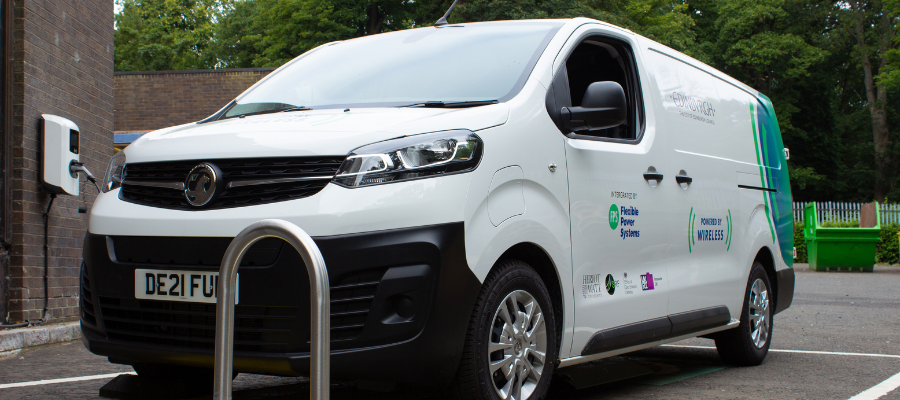🕒 Article read time: 2 minutes
Electric vans – is the future wireless?

A real-world trial of wireless electric vans goes live in Edinburgh today (Thursday 26 August 2021).
The £1.6m project is led by Flexible Power Systems (FPS), in partnership with The City of Edinburgh Council and Heriot-Watt University.
VANS EQUIPPED WITH CHARGING PAD
As part of the trial, four modified Vauxhall vans took to the streets of Edinburgh today, fitted with a slim charging pad on the underside. To charge, they are simply parked above electric pads and are topped up in under an hour with no need to plug in.
“Wireless charging could offer fleets efficiencies in terms of number of charges needed, time required for charging and space in depots, all barriers to electrification,” said Michael Ayres, FPS Managing Director. “In future, driverless vans could even be used, as no one is needed to plug in charging cables.”
Funding for the trial is being provided by the UK Government’s Office for Low-Emission Vehicles through its innovation agency Innovate UK.
TECH THAT COMPLEMENTS AUTONOMOUS VEHICLES
Heriot-Watt University has been working with industry representatives from Logistics UK and the Society of Motor Manufacturers and Traders to ensure its research in this project has real world application and relevance.
Professor Phil Greening, Deputy Director of the Centre for Sustainable Road Freight, a joint initiative between Heriot-Watt University and Cambridge University, argues that wireless charging is a “cornerstone technology” and said it will become an essential prerequisite for commercial vehicles to transport goods autonomously in the future.
“There are enormous challenges for us to overcome if we are to see autonomous commercial vehicles on our roads,” Greening said, “Our role for around the past three years, has been to explore future scenarios assisted by advanced computer modelling in order to determine the benefits of wireless charging and find solutions to these challenges.
“While shared infrastructure and collaboration have great potential to reduce the costs of decarbonising last-mile logistics, there are complex scheduling and commercial trade offs to be considered. Our research will help accelerate the decarbonisation of last-mile deliveries and crucially reduce the cost of those operations.”
SUPPORTING INNOVATION
As a member of the Centre for Sustainable Road Freight, Logistics UK takes a keen interest in all technological developments that can help facilitate the decarbonisation of van fleets.
Logistics UK’s decarbonisation lead Michelle Gardner said: “We embrace this innovative approach to decarbonising last-mile deliveries from FPS, Heriot-Watt University and The City of Edinburgh Council. It is exciting to see that this successful trial has introduced wireless charging into the mix as a real contender to help decarbonise our members’ van fleet operations. As technology is still developing and in order to meet the government’s ambitions on decarbonising transport, we continue to support all forms of innovation that will help bridge the technology gap.”
*www.logistics.org.uk/environment
Published On: 26/08/2021 16:00:26

Comments Section
If you are a Logistics UK member login to add comments.